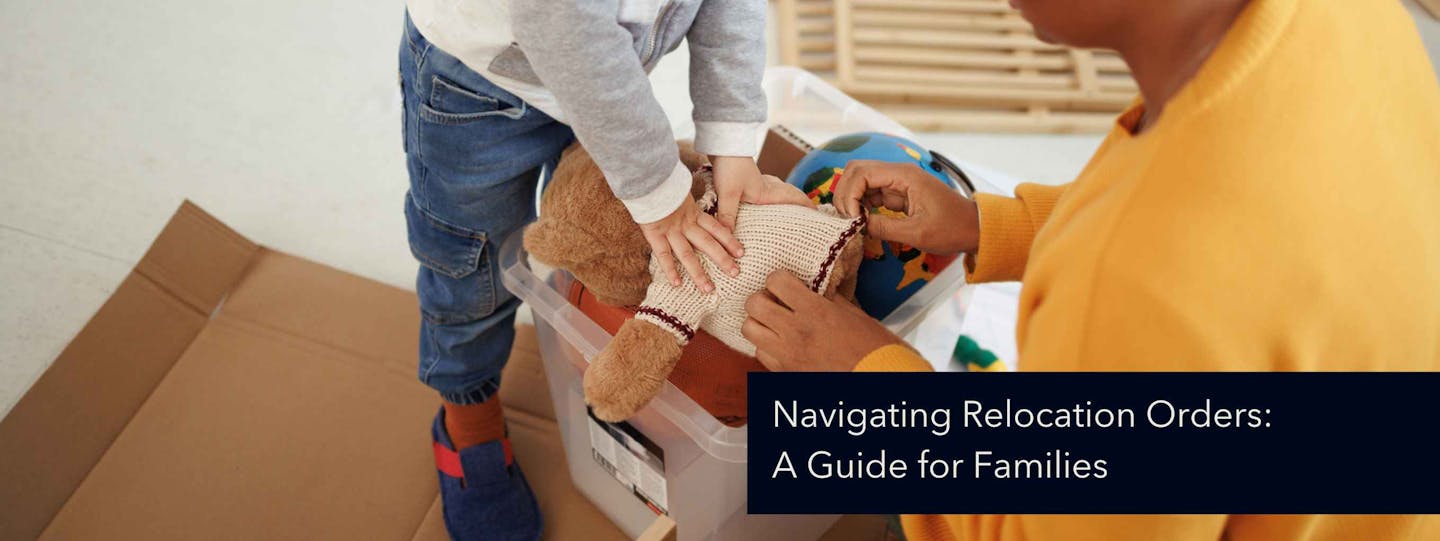
Navigating Relocation Orders: A Guide for Families
Relocating with your children after a separation or divorce can be a complicated and emotional process. In most cases you will need a Relocation Order to move forward with your plans legally.
Under Family Law the court can made Relocation Orders granting a parent permission to move with their children to a new location.
These orders often address specific concerns related to the relocation, such as ensuring the children's best interests are considered and preserving the relationship with the non-relocating parent.
Discussing your intentions with the other parent is crucial, as a mutual agreement may be reached without needing court intervention. However, if you’re unable to reach agreement, you may proceed with a formal application through the court.
Understanding the Factors That Influence Relocation Orders
Relocation Orders can be life-changing decisions for all parties involved. The court's primary concern when determining whether to grant a Relocation Order is the children's best interests.
Other factors are also considered by the court when evaluating a relocation request, and understanding these factors can help you better prepare for the process.
- Reasons for the relocation: The court will consider the motivation behind the move. Legitimate grounds may include job opportunities, access to better educational facilities, or proximity to extended family members who can provide support. It is essential to outline the benefits of the move for the children clearly.
- The relationship between the children and non-relocating parent: The court will consider the potential impact of the relocation on the children's relationship with the non-relocating parent and whether it can be maintained through alternative means, such as video calls or extended visitation periods.
- Distance and impact on existing arrangements: The court will evaluate how the proposed relocation will affect existing parenting arrangements, such as time spent with the non-relocating parent and the potential for increased travel expenses. The further the distance, the more significant the impact on the children's relationship with the non-relocating parent. Factors such as who will pay for travel expenses needs to be a factor you consider if you are looking at relocating.
- Adjustment to the new environment: The court will consider how well the children can adapt to the new location, including their ability to make new friends, maintain existing relationships, and adjust to new schools and activities.
- Domestic violence and abuse: The Court will consider any history of domestic violence or abuse involving the child or the parents. This will be essential in the court's decision if the relocating parent is moving to protect the children from an abusive situation.
Applying for a Relocation Order
The application process for a Relocation Order typically involves the following steps:
- File an Initiating Application: This document outlines your request for the Relocation Order and must be submitted to the Federal Circuit and Family Court of Australia (FCFCOA).
- Prepare an Affidavit: Along with the Initiating Application, you must submit a detailed affidavit explaining the reasons for the relocation, how the move will benefit the children, and how you plan to maintain the relationship between the children and the non-relocating parent.
- Serve the other party: The other parent must be served either personally, or on a solicitor who they may have acting for them, with your Application and all supporting documents.
- Attend the court hearing: A court hearing will be scheduled if an agreement is not reached through mediation or family dispute resolution. Both parties can present their case, and the judge will decide based on the children's best interests.
You can file an Initiating Application on your own through the FCFCOA online portal if you feel confident you are able to appear in Court unrepresented. To ensure that you are set up for success, our experienced family law solicitors can assist you in drafting your affidavit and supporting documents together with completing and lodging the required application.
The court may require you and the other parent to attend family dispute resolution (FDR) or mediation to discuss the relocation and attempt to reach an agreement. If you do reach an agreement about relocating, you can file Consent Orders with the court outlining the agreed terms.
If the court determines that a Relocation Order is in the children’s best interests, Orders will be made accordingly. It is important to note that a Relocation Order is not made lightly by the court.
Preparing for the relocation can be overwhelming, but our experienced family lawyers are here to help. We can assist you in gathering the necessary documentation, developing a well-prepared affidavit, and advising you on the best course of action, whether you’re the applicant or the respondent to a Relocation Order application.
Responding to a Relocation Order Application:
If you are a non-relocating parent and have been served with a Relocation Order application, it is essential to get legal advice so you understand your options. Our family lawyers are experienced in defending against relocation orders and will help protect your rights.
If you believe the relocation is not in the best interests of your children you can contest the Application. To do this, you will need to file a Response to Initiating Application and include an affidavit outlining your reasons for opposing the relocation.
At Zahr Partners, our family law solicitors can help you navigate the process of responding to a Relocation Order, ensuring that your concerns are effectively communicated to the court and that your rights as a parent are protected.
We can also assist with developing alternative proposals or arrangements that address your concerns while considering your children's needs.
In addition to helping with the Relocation Order process, our family law specialists can assist with modifying parenting or financial agreements to accommodate the relocation or resolving any family law disputes that may arise. Contact Zahr Partners today to discuss your unique situation.
